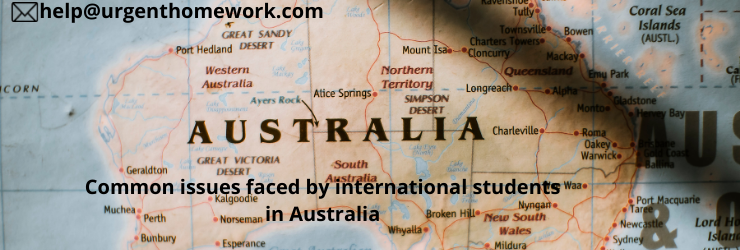Australian universities offer education that is desired by thousands of students all across the globe. The quality of education by far is the best among many international universities. The country has successfully maintained the reputation and the standards it has set, in providing diverse education. Students that graduate from Australia have high demand all over the world in their respective fields and are paid handsomely. Being an industrial country, it has the most advanced technologies. The scientific approach of teaching in universities drags the attention of students worldwide. Government is keen and continuously working for maintaining high standards in education.
Besides this, the methodology of teaching used in most institutes is very diverse. There is a high number of courses on offer at these universities that grab the eyeballs of students. Comfortable courses, will fit perfectly to your need, and help you grow are available. Universities put forth flexibility to shift between courses. Australia has friendly natives, which will help you a lot with non-educational needs. The teaching staff is highly skilled with top qualifications.
However, even though the country has all these qualities, it is only natural for international students to face some issues. Some of these problems are completely isolated from the education system, such as the hard-to-understand accent, harsh weather, high cost of living, etc.
But they do exist.
Here, we discuss some of these problems that the international students living in Australia face.
- An unfamiliar education system
The education system followed by Australian universities focuses more on practical knowledge and the ability to implement the topic you have learned. There will be theory classes with a fixed timetable. You will be given assignments from time to time, on which you will be judged. Less attention is given to theory exams as they depend only on memorizing concepts and not the applied aspects. The assignments are checked thoroughly and any incidence of plagiarism is highly discouraged. You are warned about this at the beginning itself at most of the universities. In fact, at many institutes, plagiarism caught more than thrice may lead to cancellation of visa or other similar actions will be taken.
The course you take admission in must be clear to you since day one. The education system is divided into 10 levels which ultimately lead you to a doctorate. The grading pattern is based on points. Points are allotted on a scale of 7. A person can have a maximum of 7 points and a minimum of 1 point (indicating the overall score is less than 20%). Most international students that take admission to Australian universities are graduates and are looking for post-graduate courses. Different counties have different systems leading to a difference in the age of students studying in the same class. This can lead to a difference in the mental maturity of students and low compatibility among peers. Therefore, the choices in subjects should be wise and pre-planned. Many people make mistakes while choosing the course and tend to choose the wrong one which can be the worst nightmare for any student. As a result, getting acquainted with the syllabus and the education system is necessary to avoid such mishaps.
- Language and accent
For any international student moving to Australia, it might be a good idea to make sure you are fluent and familiar with English. Start practicing it much before you have thoughts of taking admission in Australia. The Australian accent is difficult to understand for people who are new to English or not much used to it. This is one of the most common issues faced by students studying in <a href=”/au/” title=”Australia Assignment Help”>Australia</a>. This problem is solved slowly, with time. You will sooner or later get used to the accent and will be able to cope with it.
Watching Australian movies or interacting with people with Australian accents frequently might help you a lot. Listening to good English over podcasts or other similar platforms can boost your understanding process. As assignments carry more than half of the weightage, there are many assignments allotted to groups. Due to the presence of a lot of international students, there is often a communication gap. Students who are not so used to English might find it difficult to put forth their point of view. It is important to consider everyone’s perspective in the group to lead a successful project. And hence, learning the language beforehand may be a good idea.
- Finding the right job
To get a job in Australia is not a battle that you can take lightly, especially if you didn’t pay much attention to your college lectures. You might have to do odd jobs, like working in coffee shops, a bar, or a mall. Yet you need to have some additional skills which will give you benefits. It’s not easy for someone with limited skills to find their dream job. Having experience will surely help you to get one easily. Specifically, experience with renowned companies will add to it.
Another way to get a job is by getting referred by somebody you know. If you know somebody working, they can help you find the right opportunities. Most companies will hire you on a reference basis. A student with a working visa can have a limit of 20 hours per week to work. This is barely sufficient to earn a living in Australia, but it will relieve stress on expenditure. Some get a job in a day while some may take a month. Be prepared for everything that comes to you. Do not panic if you meet the latter faith. You will get a job eventually. No matter how much time it takes, do not lose hope. The idea is to keep going.
- Extreme Weather
In some places in Australia, you can find that the temperature is extreme. It would be a good idea to know what you’re in for. For winters, make sure that you have a bunch of warm clothes. If not, you are likely to encounter trouble. The temperature may vary from about fifteen degrees in day times and might fall in negative at night during winters. Accommodating a heater can help you a lot. If you are a resident of a relatively warm country, it will be difficult for you to adjust to temperature initially. Summers are relatively bearable, yet residents from cooler areas find it difficult to adjust. Eventually, your body will get used to it.
- Lack of Proper Guidance
It is important to have guidance for international students, as it is a completely different atmosphere. The law and order are completely different from other countries. A solution to this is an orientation program. DO NOT miss the orientation program. This program is conducted in the initial days of schooling as an introductory lecture, which guides you about the general rules and regulations. There are many strict rules which you need to know about before you start your education. The courses are briefed, subjects are introduced and general rules that are important to know when you live in Australia are informed about. Orientation programs are a manual of your journey in Australia. Teachers are very friendly to talk to about academics. You can straight away talk to them about problems you face with any particular subject. They are highly skilled with their work and will surely guide you on the right path.
- Managing Expenses
Most students find Australia expensive and are somewhat forced to have a high living standard than their parent county. Working can always be a wise option to support your finances. If you are planning not to cook and have food from restaurants and eateries, then you need good financial support to back your luxuries. Food is way costlier as compared to other necessities.
Getting vegetarian food for students who come from countries like India can be quite a hard task. Non-vegetarian food is easily accessible as compared to vegetarian. The availability of pork and beef is ample over chickens. If you are strict with your eating habits, you need to instruct the cook every time you are up for feeding yourself. Another major difference is found in the costlier water. In many countries drinking water is way cheaper for any person to own or is either free of cost, whereas, in some parts of this country, you may need to pay heavily as compared to other places.
- The Culture Differences
Being one of the most developed countries, Australia has a high standard of living, with a highly impressive literacy rate and different clothing patterns. The students need to understand that different person will have different points of view and ways of living. Since there is a diversity of students from over the globe under a roof, it often becomes difficult to make new friends. Understanding their way of living, matching up with the culture or food habits is necessary. Gesture differences might be problematic. You will need to know table manners or you might be criticized if you lack them.
Reaching everywhere before the allotted time should be practiced as time etiquettes are rigorously followed. Some gestures might be completely new for some students, for example. Doing due research about how the Australian culture can be different than your native country can be quite helpful for you. Normalizing the food and clothing practices can bring you off from cultural shock. Accepting people the way they are should be prioritized. For example, the faculty members and staff are usually addressed by their names while in some countries this might be an uncommon practice.
- Transportation
Students generally prefer to rent a flat in the outskirts of cities, as the rents away from the main city are quite affordable, especially for students. The center of the city will have rents as high as the sky. This adds additional expenses of traveling to universities. The common mode of transport is by train. If you are familiar with trains and their routes, then traveling will be a cakewalk for you.
Most of the trains start from the city or nearby station. You need to have a habit of walking, to reach the pickup stop of public transport, as fewer private vehicles are running if you are renting in outskirts. Living in the city may help you get rid of transportation costs and the trouble of walking a lot. However, it will surely add to a costlier residence, yet the living standards are worth it.
- Managing Health Issues
Due to the differences in weather, the majority of students find it difficult to confront the changes until their bodies adapt to them. Always have a financial backup that you save only for medical purposes. A high stander of living affects healthcare facilities too. You will need an appointment beforehand. No patient is entertained without an appointment unless in an emergency. Emergency services are highly expensive. Even a normal checkup might cost you half of your earnings for a month.
You should ensure to carry a medical prescription from your family doctor for common issues, or daily drugs if you have health issues. You will not get any medicine without a prescription. Having a prescription for viral infection can help you cut extra expenses. Very often due to stress and bad weather, health becomes an issue. Managing stress should be a learned skill, which will make many things easier.
- Time management
Assignments form an indispensable part of a student’s life. The number of assignments that you may get may vary from 4-5 a week. Examinations are also conducted timely which will take a lot of your time to prepare for. The assignments are not easy to work on. With time, it also demands practical knowledge of the subject and will have no other option than to study the subject thoroughly. Adding to it, if you choose to work, then the daily duration of work should be such that you should be able to manage studies as well. You should pre-plan the strategy to ensure ease of living. Working rules are strict and hours will be kept track on. Performing well with academics should be a prime goal for any student, and hence, you need to master time management.
- Homesickness
This is perhaps true for international students living in any part of the world. Many students may have never been away from home and it may be their first time being away from their close ones. It is obvious to feel homesick. Video calls will help you a lot. Keep in touch with your parents. Notify them about daily routine and spend quality time together, over calls. Having a hard copy of photographs can do much.
Also, keep in mind that having a healthy conversation is a basic need. Specifically, the fact that you cannot travel across whenever you feel like meeting should be kept in mind while moving out. Many universities have clubs and arrange parties to bring up the social aroma and reduce the awkwardness. Embracing the beauty of diversity and adjusting to new life in Australia will help you adjust to your studies as well. Mental health should be taken care of, and talked about, from time to time.



